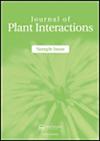内生真菌Bipolaris sp.CSL-1通过调节其内源性激素、抗氧化系统和基因表达诱导甘氨酸的耐盐性
IF 3.3
3区 生物学
Q2 PLANT SCIENCES
引用次数: 13
摘要
摘要盐度胁迫是抑制植物生长的最严重的环境胁迫之一。在本研究中,我们采用了一种环境友好的技术,筛选了不同植物生长促进真菌,以适应不同的植物生长促进(PGP)特性和盐度胁迫。在这些分离株中,根据植物生长促进特性,如产生吲哚-3-乙酸(IAA)、赤霉素(GAs)、有机酸和对氯化钠(NaCl)胁迫的抗性,选择了双极菌(Bipolaris sp.CSL-1)。研究发现,在NaCl胁迫下,用CSL-1菌株接种大豆显著增加了地上部和根部的长度、地上部和根的鲜重和干重以及叶绿素含量(200 mM)。在NaCl胁迫下,CSL-1接种植物的内源脱落酸(ABA)水平显著降低,而水杨酸(SA)水平升高。NaCl处理的未接种植物表现出较高水平的抗氧化剂和氧化应激,如过氧化物酶、多酚氧化酶(PPO)、丙二醛(MDA)和超氧阴离子(SOA)。此外,接种CSL-1提高了大豆对NaCl胁迫的抗性,GmFDL19、GmNARK和GmSIN1的表达水平显著降低。因此,真菌分离株CSL-1减轻了盐胁迫的影响,促进了大豆的生长,可能成为受盐影响地区有价值的生态友好微生物资源。本文章由计算机程序翻译,如有差异,请以英文原文为准。
Endophytic fungus Bipolaris sp. CSL-1 induces salt tolerance in Glycine max.L via modulating its endogenous hormones, antioxidative system and gene expression
ABSTRACT Salinity stress is one of the most serious environmental stress that inhibits plant growth. In this study, we adopted an environment friendly technique and screened different plant growth-promoting fungi for different plant growth promoting (PGP) traits and salinity stress. Among those isolates, Bipolaris sp. CSL-1 was selected based on plant growth-promoting characteristics, such as producing indole-3-acetic acid (IAA), gibberellins (GAs), organic acids and resistance to sodium chloride (NaCl) stress. Here, we found that inoculating soybean with isolate CSL-1 significantly increased shoot and root length, shoot and root fresh and dry weight and chlorophyll content under NaCl stress (200 mM). Endogenous abscisic acid (ABA) levels were significantly decreased, whereas salicylic acid (SA) levels were increased in CSL-1-inoculated plants under NaCl stress. NaCl-treated noninoculated plants showed higher levels of antioxidants and oxidative stress such as peroxidase, polyphenol oxidase (PPO), malondialdehyde (MDA) and superoxide anion (SOA). Furthermore, CSL-1 inoculation improved soybean resistance to NaCl stress, and there was a significant decrease in GmFDL19, GmNARK, and GmSIN1 expression levels. As a result, the fungal isolate CSL-1 mitigates the effect of salt stress and enhance soybean growth and might be used as a valuable ecofriendly microorganism resource in salt-affected areas.
求助全文
通过发布文献求助,成功后即可免费获取论文全文。
去求助
来源期刊

Journal of Plant Interactions
PLANT SCIENCES-
CiteScore
5.30
自引率
6.20%
发文量
69
审稿时长
>12 weeks
期刊介绍:
Journal of Plant Interactions aims to represent a common platform for those scientists interested in publishing and reading research articles in the field of plant interactions and will cover most plant interactions with the surrounding environment.
 求助内容:
求助内容: 应助结果提醒方式:
应助结果提醒方式:


